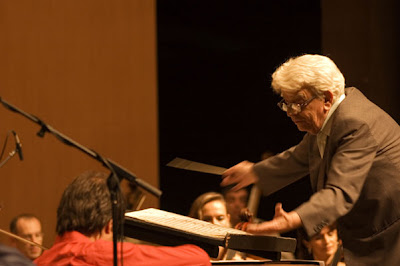 During the '50s, '60s and '70s, most of the unsung heroes in the Brazilian music scene were master arrangers based in Rio de Janeiro, mainly Lindolfo Gaya, Lyrio Panicalli and Leo Perachi -- with J.T. Meirelles, Eumir Deodato, Geraldo Vespar, Erlon Chaves, Mario Castro-Neves, Oscar Castro-Neves and Cesar Mariano among their followers.
During the '50s, '60s and '70s, most of the unsung heroes in the Brazilian music scene were master arrangers based in Rio de Janeiro, mainly Lindolfo Gaya, Lyrio Panicalli and Leo Perachi -- with J.T. Meirelles, Eumir Deodato, Geraldo Vespar, Erlon Chaves, Mario Castro-Neves, Oscar Castro-Neves and Cesar Mariano among their followers.In São Paulo, the heroes were Cyro Pereira, Rogério Duprat, José Briamonte and Luiz Arruda Paes.
The Rio Grande do Sul-born Cyro Pereira (aka Ciro Pereira), my personal favorite among all those São Paulo-based maestros, passed away today, in São Paulo city, at age 81, after a long battle against lung cancer (yes, he was a wild & indomatable smoker, unfortunately...) He wrote 2,000-plus arrangements for recording sessions, movie soundtracks, radio and TV broadcasts (from Elis Regina to Tom Zé to Zimbo Trio), but released only one album as a leader, "Cyro Pereira - 50 Anos de Música," which came out in 1997 but soon turned into an impossible-to-find record. Recorded in February 1997 in São Paulo with the Jazz Sinfônica Orchestra, it was mixed & mastered in Oslo, Norway, by engineer Jan Erik Kongshaug.
 As a composer, the songs he co-wrote with pianist Mario Albanese for the "Jequibáu" project (released in Brazil by Chantecler and in the USA by the Epic label) became legendary, being recorded by such acts like Andy Williams, Vic Damone, Percy Faith and, most recently, LA-based jazz saxophonist Mary Fettig.
As a composer, the songs he co-wrote with pianist Mario Albanese for the "Jequibáu" project (released in Brazil by Chantecler and in the USA by the Epic label) became legendary, being recorded by such acts like Andy Williams, Vic Damone, Percy Faith and, most recently, LA-based jazz saxophonist Mary Fettig.
 But, as an arranger-conductor, the highlights of his brilliant career were the collaborations with Zimbo Trio on such albums as "Zimbo + Metais / Decisão" (recorded for RGE with a brass section) and the two brilliant volumes of "Zimbo Opus Pop" (both on Philips) for which he provided superb orchestral scores, adapting the works of Rimsky-Korsakov, Fauré, Chopin, Bach, Mozart, Vivaldi, Beethoven, Grieg, Granados and Albeniz for stunning bossa-jazz grooves. Such tracks also are lessons in instrumentation, revealing that Pereira was in the same creative level of Don Sebesky and Bob James during the CTI heyday. With a plus: he used Clelia Simone's fabulous wordless vocals as another instrument, writing some impossible-to-sing lines in counterpints or unisons with the string and horn sections, as well as with single instruments - from a piccolo to a bass trombone.
But, as an arranger-conductor, the highlights of his brilliant career were the collaborations with Zimbo Trio on such albums as "Zimbo + Metais / Decisão" (recorded for RGE with a brass section) and the two brilliant volumes of "Zimbo Opus Pop" (both on Philips) for which he provided superb orchestral scores, adapting the works of Rimsky-Korsakov, Fauré, Chopin, Bach, Mozart, Vivaldi, Beethoven, Grieg, Granados and Albeniz for stunning bossa-jazz grooves. Such tracks also are lessons in instrumentation, revealing that Pereira was in the same creative level of Don Sebesky and Bob James during the CTI heyday. With a plus: he used Clelia Simone's fabulous wordless vocals as another instrument, writing some impossible-to-sing lines in counterpints or unisons with the string and horn sections, as well as with single instruments - from a piccolo to a bass trombone.Heitor Villa-Lobos' "Festa no Sertão" (the third movement from the "Ciclo Brasileiro" originally written in 1937 for piano solo), a track from "Zimbo Opus Pop Nº 2," unfortunately one of the few without Clelia's voice (this long-forgotten woman is, undoubtedly, one of 10 best female singers in the history of Brazilian music, you can take my word for it) was selected by producer Arnaldo DeSouteiro for the best-selling compilation "A Trip To Brazil Vol. 3: Back to Bossa," released in 2002 by Verve/Universal.
Three years later, I had the honor to meet Cyro Pereira in person, when working with him in a concert project with the Jazz Sinfônica, an orchestra he founded in São Paulo, remaining there as musical director and chief conductor until his death.
A couple of years ago, two of those great arrangements for the Zimbo Trio -- Bach's "Prelude #2" and Rimsky-Korsakov's "Scheherazade" -- were re-recorded by the group for a DVD (with a symphony orchestra) that celebrated the 45th anniversary of the group and was released in 2011. But it's a shame that there's no DVD showcasing Cyro Pereira's incredible artistry as a conductor. Brazil...





No comments:
Post a Comment